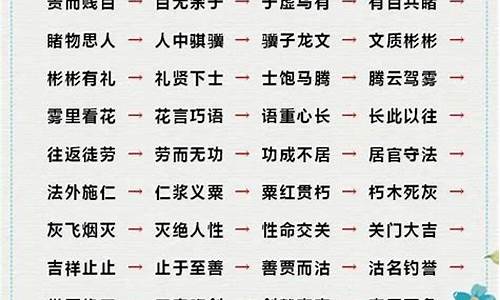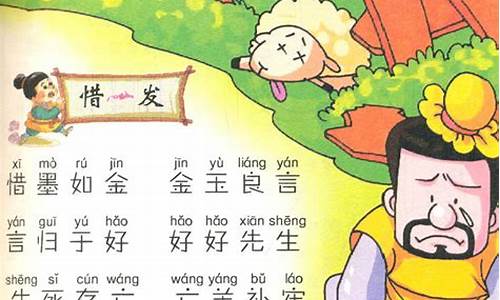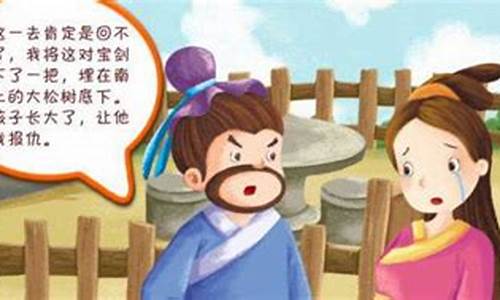您现在的位置是: 首页 > 成语解释大全 成语解释大全
关于英语成语的论文_关于英语成语的论文题目
ysladmin 2024-05-13 人已围观
简介关于英语成语的论文_关于英语成语的论文题目 对于关于英语成语的论文的问题,我有一些专业的知识和经验,并且可以为您提供相关的指导和建议。1.有没有翻译英文的朋友啊?求一英语作文成语故事2.求一篇关于邯郸的英语成语演讲稿3.四
对于关于英语成语的论文的问题,我有一些专业的知识和经验,并且可以为您提供相关的指导和建议。
1.有没有翻译英文的朋友啊?求一英语作文成语故事
2.求一篇关于邯郸的英语成语演讲稿
3.四年级看英语故事学成语五篇
4.有关英语谚语翻译的论文或资料
5.英语毕业论文题目用"英汉成语的翻译"好不好
6.用英语介绍成语文化

有没有翻译英文的朋友啊?求一英语作文成语故事
塞翁失马Blessing or Bane
战国时期,靠近北部边城,住着一个老人,名叫塞翁。塞翁养了许多马,一天,他的马群中忽然有一匹走失了。邻居们听说这件事,跑来安慰,劝他不必太着急,年龄大了,多注意身体。塞翁见有人劝慰,笑了笑说:“丢了一匹马损失不大,没准会带来什么福气呢。”
邻居听了塞翁的话,心里觉得很好笑。马丢了,明明是件坏事,他却认为也许是好事,显然是自我安慰而已。过了几天,丢失的马不仅自动返回家,还带回一匹匈奴的骏马。
邻居听说了,对塞翁的预见非常佩服,向塞翁道贺说:“还是您有远见,马不仅没有丢,还带回一匹好马,真是福气呀。”
塞翁听了邻人的祝贺,反而一点高兴的样子都没有,忧虑地说:“白白得了一匹好马,不一定是什么福气,也许惹出什么麻烦来。”
邻居们以为他故作姿态纯属老年人的狡猾。心里明明高兴,有意不说出来。
塞翁有个独生子,非常喜欢骑马。他发现带回来的那匹马顾盼生姿,身长蹄大,嘶鸣嘹亮,膘悍神骏,一看就知道是匹好马。他每天都骑马出游,心中洋洋得意。
一天,他高兴得有些过火,打马飞奔,一个趔趄,从马背上跌下来,摔断了腿。邻居听说,纷纷来慰问。
塞翁说:“没什么,腿摔断了却保住性命,或许是福气呢。”邻居们觉得他又在胡言乱语。他们想不出,摔断腿会带来什么福气。
不久,匈奴兵大举入侵,青年人被应征入伍,塞翁的儿子因为摔断了腿,不能去当兵。入伍的青年都战死了,唯有塞翁的儿子保全了性命。
Near China's northern borders lived a man well versed in the practices of Taoism. His horse, for no reason at all, got into the territory of the northern tribes. Everyone commiserated with him.
"Perhaps this will soon turn out to be a blessing," said his father.
After a few months, his animal came back, leading a fine horse from the north. Everyone congratulated him.
"Perhaps this will soon turn out to be a cause of misfortune," said his father.
Since he was well-off and kept good horses his son became fond of riding and eventually broke his thigh bone falling from a horse. Everyone commiserated with him.
"Perhaps this will soon turn out to be a blessing," said his father.
One year later, the northern tribes started a big invasion of the border regions. All able-bodied young men took up arms and fought against the invaders, and as a result, around the border nine out of ten men died. This man's son did not join in the fighting because he was crippled and so both the boy and his father survived.
求一篇关于邯郸的英语成语演讲稿
First catch your hare。勿谋之过早(意指:不要过于乐观)。
You cannot run with the hare and hunt with hounde。不能两面讨好(意指:不要耍两面派)。
Hares may pull dead lions by the beard./Even rabbits insult an dead lion。
虎落平阳被犬欺。
He who follows two hares is sure to catch neither. 追逐两只兔,两头都落空。
The tail of a rabbit-cannot be long。兔子的尾巴--长不了。
与“兔”有关的谚语The fox preys farthest from his hole. 兔子不吃窝边草。
Even a rabbit will bite when it is cornered. 兔子逼急了还会咬人呢!
Foxes grieve over the death of rabbits。兔死狐悲
A sly rabbit will have three openings to its den. 狡兔三窟
Waiting for a rabbit to hit upon a tree and be killed in order to catch it. 守株待兔
A rabbit is never caught twice in the same place. 同一个错误不会犯两次。
Cows can catch no rabbits. 老牛追兔子:有劲使不上。
The hounds are killed for food once all the hares are bagged。兔死狗烹:
四年级看英语故事学成语五篇
Handan: the hometown of idiom and allusions
Cishan Culture an early Neolithic culture in the Yellow River of China, occupied from about 6500-5000 BC. The site is located on an alluvial terrace near the modern town of Cishan in Wu'an County, Hebei Province, and has evidence of barley, rice, and millet farming as well as domesticated pigs, dogs, and chickens. Cishan represents one of the oldest sites in the world to have evidence for domesticated dogs and pigs. The millet was recovered from 80 hoards, some of which were two meters in height. The Cishan Cultural Remains Site, occupying a land area of near 140,000 square meters, has been listed as the nation key cultural relic preservation organ by the State Council. These cultural relics proved that, as early as in more than 7300 years ago, the ancients already resided in half burrow -like house, primarily has been settling down the life by the primitive.
The Handan Dream one of the literary masterpieces written by Chinese dramatist Tang Xianzu in the Ming Dynasty (1368-1644), is adapted from Shen Jiji's romance story A Tale within the Pillow. And what’s more, the idiom Living in a fool's paradise derived from this story. It was about a scholar who went to the capital for the civil exam and was enlightened by an Immortal. Lu Sheng , the protagonist, is a down-and-out scholar who meets with Lu Dongbin, an immortal on a mission to convert a man into the world of the ever living, at a small inn in the city of Handan. Upon hearing Lu Sheng's complaint about his wretched life, Lv Dongbin lends him a porcelain pillow to sleep on. In his dream, Lu Sheng experience 50 years of vicissitudes of life as a high official, only to wake up to the stark reality that the yellow millet the innkeeper has been cooking for him is not yet done. The drama captures the seamy side of officialdom in the feudal society.
There are over 500 Chinese idioms and allusionsare derived from Handan, including the following typical ones: Riding and shooting in Hu's garbs 胡服骑射), Living in a fool's paradise, Returning the jade intact to the state of Zhao ( 完璧归赵), Carrying rod to ask for punishment ( 负荆请罪), Imitating another without success and losing what used to be one's own ability (邯郸学步), Volunteering one’s service (máo suì zì jiàn 毛遂自荐), Relieving the besieged by besieging the base of the besiegers (围魏救赵), No one picks up and pockets anything lost on the road (路不拾遗), Embracing a woman on his breast, one has no indecent feeling (坐怀不乱), Worth a couple of towns together ( 价值连城), When the snipe and the clam grapple, it is the fisherman who stands to benefit ( 鹬蚌相争, 渔翁得利), Burning one's own way to retreat and being determined to fight to the end (破釜沉舟), The proverbial Lord Ye who claimed to be fond of dragons was in fact mortally afraid of them (叶公好龙).
Tai Chi is definitely part of the life in Handan. Early morning walks are rewarded with high quality Yang-style Tai Chi (杨式太极) being performed all over the place. Each morning on one of Handan's main squares, large groups of Tai Chi practitioners gather to study with a variety of teachers, and the quality is really good. The original home of the Yang Family is actually just outside Handan near a walled village called Guangfu (广府), which is an hour's bus ride from Handan. It has the potential to be quite a nice area. They are doing it up at the moment, and it will obviously be a tourist attraction in the future.
说实话,我也真的是很想帮你写一篇,我呢也是邯郸人,呵呵,一篇关于邯郸古城的英文的介绍或者成语的介绍是早晚要用的,,不过,我真的是很忙,所以谷歌了一篇文章,我个人认为这篇文章还是不错的 呵呵
有关英语谚语翻译的论文或资料
A man of the state of Chu (chǔ guó 楚国) had a spear and a shield for sale.楚国有个卖兵器的人,在市场上卖矛和盾。
He was loud in praises of his shield."My shield is so strong that nothing can pierce it through."
为了让人家愿意买他的货,他先举起盾向人们夸口道:“你们看,我的盾是世上最坚固的盾,任何锋利的东西都不能刺穿它。”
He also sang praises of his spear."My spear is so strong that it can pierce through anything."
接着又举起他的矛,向人吹嘘说:“你们再看看我的矛,它锋利无比,无坚不摧,无论多么坚硬的盾,都挡不住它,一刺就穿!”
"What would happen," he was asked, "if your spear is used to pierce your shield?"
人群中有人问道:“如果用你的矛去刺你的盾,结果怎么样?”
It is impossible for an impenetrable shield to coexist with a spear that finds nothing impenetrable.
这世界上一样无坚不摧的东西永远不会与一样什么都能摧毁的东西共存。
文化链接
“自相矛盾”的英文表达,常用“to contradict oneself”,比如:“你自相矛盾了”就可以说:“You're contradicting yourself.”或者“You've contradicted yourself.”
曾经有一个英文帖子就讨论过“Can you contradict yourself in one sentence? ”(你能在一句话里面做到自相矛盾吗?),答案千奇百怪,这里就给大家看两个例子~
1. In the military it's, "Hurry up and wait."(在军队里,有一种说法叫做“Hurry up and wait. ”,英语解释是:“The concept of making every effort to arrive at a location ahead of the appointed time, with the expectation of having to wait upon arrival. ”也就是说不惜一切力量在指定时间之前就到达了目的地,但自己知道到达之后也要一直等到指定的时间。“hurry up(迅速)” 和“wait(等待)”是含有一定相对意义的词,所以就在这么简短的一句话中,就做到了自相矛盾~这句话也被广泛应用在各个场所、各个领域)
2.Yes, I can't.(这句有很简短啊,同时还达到效果了~“yes(是的)”和“can't(不能、不会)”形成了自相矛盾的效果)
第二篇:画饼充饥
看故事学成语:画饼充饥
Lu Yu lived in the Kingdom of Wei during the Three Kingdoms periods. He was orphanedat the age of ten.
三国时代,魏国有个叫卢毓(Lú Yù )的人,很小的时候就失去了父母和两个哥哥。
So he undertook the task of supporting his sister-in-law and nephew through a period of extreme hardship.Meanwhile, he also studied hard. He was praised all around for his noble deeds and depth of knowledge.
卢毓从此辛苦工作,除了照顾哥哥们的家人外,自己还努力读书,受到大家的赞许。
Later he became an official and still worked hard and put forth valuable advice to the emperor, so the emperor placed great trust in him.
后来,卢毓做了官,仍然勤恳工作,经常给皇帝提出好建议,得到皇帝的信任。
At that time, the selection process of government officials depended on the recommendation of powerful and influential men.
那时候,朝廷选拔官吏,一般都是由有名望的人推荐,而推荐的人,一般又只在有名望的人里考虑。
These men would always recommend famous persons who were all mouth and no action which displeased the emperor.
其实,好多有名望的人只是嘴上能说,并不会干实际的事,因此,皇帝很不满。
One time, the emperor asked Lu Yu to recommend an official and said to him: "the selection of government officials should not rely solely on one's fame which is just like a cake drawn on the ground, while it may be good to look at it does not satisfy one's hunger."
有一天,皇帝准备选拔一个有才能的人,并要卢毓推荐,还说选择人才不能光找有名声的人,名声只不过是画出来的一张饼,只能看,不能吃的。
This story gave rise to the idiom "draw a cake to satisfy hunger. " Now it is used to describe someone who uses fantasy to satisfy oneself and means that empty reputation is of no practical value.
后来,人们就用这个成语比喻自己安慰自己,不能解决实际问题的方法。
成语活用
Your action is just like drawing a cake to satisfy hunger, which has no practical effect.
你这种做法只是画饼充饥,没有任何实际作用。
第三篇:刮目相看
看故事学成语:刮目相看
Lv Meng (lǚ méng 吕蒙) was a general of Wu during the Three Kingdoms Period (三国时代,220-280AD).
三国时期(220-280),吴国有一个叫吕蒙的将军
He was born in such a poor family that he did not get any chance to go to the school when he was a child.
吕蒙出生在穷苦人家,小时候没有机会上学。
However, there was still less time for reading when he served in the army after he grew up.
长大后他参了军,看书的时间更少了。
Once the king of Wu summoned Lv Meng and said to him, "Since you are now a general in power, you had better read some books to widen your horizon."
一次,吴国的皇帝召见吕蒙,对他说:"现在你是大将军了,应该多看看书开阔眼界。"
Lv Meng answered, "I am so busy with military affairs that I am afraid I have little time to read."
吕蒙回答道:"军中的事务这么忙,我恐怕没有时间读书。"
The King said, "Are you busier than I am? Even I often find time to read books on the art of war and gain much benefit from them. To read more about the experience left by our ancestors will make you progress."
吴国的皇帝说:"你难道比我还忙吗?我常常抽空阅读兵书,从中得到了不少好处。多看看前人的经验之谈,你会有更大的进步。"
Lv Meng then did according to what the king said. He concentrated himself on reading history and military writings.
吕蒙接受了皇帝的建议,从此开始专心阅读,看了很多历史和军事书籍。
On day, Military Governor Lu Su visited Lv Meng and was surprised to find that Lv Meng had become very knowledgeable.
一天,主帅鲁肃来拜访吕蒙,惊讶地发现吕蒙变得很有学问。
Lu Su, who held Lv Meng in contempt earlier, said, "I did not expect that you would know so much besides fighting! You are not the one you used to be!"
曾经非常轻视吕蒙的鲁肃说:"我以为你只会打仗,没想到你这么博学。你已经不是过去的那个吕蒙了!"
Lv Meng replied, "You should look at a person with new eyes even only after a three days' separation."
吕蒙回答道:"即使你和别人只分开了三天,三天后再遇到他时也不能用三天前的老眼光来看待他。"
Today, when a person does something that causes others to see him differently, we can say that people "look at him with new eyes."
今天,当一个人做了某些事,令别人另眼相待时,我们就可以说,对他“刮目相看”了。
中外差别
英语中有一个与“刮目相看”意义大致相近的短语,叫做“knock the socks off”,直译就是“把~的袜子都撞掉了”,也就是让某人刮目相看的意思啦。同样的,如果别人让你刮目相看的话,你也可以说:“Hey,dude~You really knocked my socks off!”
成语活用
Next quarter I really want to knock the socks off the competition.
下一季我非常希望可以让竞争对手刮目相看。
第四篇:拔苗助长
看故事学成语:拔苗助长
There once was an impatient farmer who lived during the Song Dynasty.(sòng cháo,960-1279 AD).
春秋时代,宋国有个急性子的农夫。
Everyday the anxious farmer would measure the growth of the crops.
庄稼长出禾苗以后,他每天都去观看。
To his dismay, his crops were growing much slower than he expected.
令他沮丧的是,禾苗长得太慢。
The farmer racked his brains trying to find better ways of planting in order to get quickerresults.
农夫绞尽脑汁想让禾苗长快些。
One day he finally came up with a solution.
一天他终于想出方法。
He started to physically pull the crops out of the ground, thus making them taller.
他跑到田里,把禾苗一颗颗往上拔,使它们长高。
The farmer worked very hard and at day’s end was physically exhausted but mentally happy as his plan had produced the desired results.
农夫虽然很累但他很高兴看到禾苗长高。
When the farmer went home, he told his son of his “brilliant” method.
当农夫回家时,把这个好办法告诉了他儿子。
His son went to the field only to discover that all of his crops were all dead.
他的儿子赶忙跑到田里去看,禾苗全都枯萎了。
成语活用
To educate the young generation in such a way is just like helping the shoots grow by pulling them upward.
用这种方法教育下一代无异于拔苗助长。
第五篇:东窗事发
看故事学成语:东窗事发
During the final years of the Song dynasty (sòng cháo 宋朝), China was invaded by Jin(jīn金) people from the north.
宋朝末年,北方的金人来侵犯。
General Yue Fei led the army in resistance, and defeated the enemy.
将军岳飞率领军队勇敢抵抗,终于把敌人打败。
Just as he was about to take advantage of his victory and attack the Jin army, he received word that the emperor had ordered him to return.
正想乘胜追击敌人的时候,忽然皇帝下了十二道金牌,命令岳飞和军队立刻回去。
As it turned out, this was actually a plot of Chin Hui, a Sung dynasty official who wasconspiring with the enemy.In order to frame Yue Fei, Chin Hui had tricked him intoreturning early.
原来这是私通敌人的太师秦桧的诡计,假冒皇帝的意思来陷害岳飞。
Chin Hui had thought this plot up together with his wife, under the east window of their house.
秦桧的这些诡计,都是他和妻子王氏在家里的东窗下秘密商量出来的。
Sometime later, Chin Hui and his son Chin Shi died, one right after the other. Chin Hui's wife hired someone who could communicate with ghosts and spirits to come and find out how her husband and son were doing after death.
后来秦桧和他的儿子秦僖相继死亡,王氏请了几个研究神鬼灵魂的人来,想知道他们父子死后的情形。
After he had finished, the man said to her, "I first went to see your son, who told me that your husband was in the city of Feng-du. So I went there and found him doing hard labor, wearing iron cangue. He asked me to tell you that the thing which you two discussed under the east window has already been exposed."
来的人在做法以后告诉王氏说:“我先见到了公子秦僖,他告 诉我秦太师在酆都城,我到了酆都城,看见太师正戴着铁枷做苦工呢。他让我转告你,你们在东窗下商量的那件事已经被揭发了。”
Now, when a wrong-doing is brought to light, it may be said that "the affair of the east window has been exposed."
现在当一件丑事被曝光之后,就可以说是:“东窗事发”了。
中外差异
A secret is like a cat that has been kept in a bag. Once you let the cat out of the bag, it goes wherever it wants.
英语中的与“东窗事发”意义相近的是“the cat is out of the bag”,就是“猫从袋子里走出来了”,可以把猫想象成“秘密”,把不为人知的秘密藏在袋子里,猫一旦从袋子中走出,秘密也就随之公开了,也就是“东窗事发”。
成语活用
I've been keeping that thing a family secret.But now the cat is out of the bag because of you!
我一直把那件事当做家族的秘密,但如今却因为你而东窗事发!
英语毕业论文题目用"英汉成语的翻译"好不好
(英语系毕业论文)英文谚语的文化场景在中译文中的缺失与弥合
/soft/20/233/2008/224306019308.html
摘 要
本文从谚语文化角度着手,分析谚语中的文化因素,以及英汉谚语中的文化差异,尝试研究在谚语的英汉翻译过程中发生文化缺失时如何弥合。最终通过意译手段实现英语谚语的可译性,从而顺利完成跨文化交际活动,实现国际间的文化交流与传播。
关键词 谚语文化; 文化缺失; 意译; 翻译补偿
Contents
Abstract Ⅰ
Keywords Ⅰ
摘要 Ⅱ
关键词 Ⅱ
Introduction 1
I. The Brief Introducton to Proverb 3
II. Proverb Culture 5
A.Cultural Factors in Proverb 5
B.The Different Cultures Between English and Chinese Proverb. 5
1.Custom 5
2.Religious Belief 6
3.Different Living Conditions. 8
III. English Proverb Translation 9
A.Attentions in English to Chinese Translation 9
1.Misinterpretation of English Proverb 9
2.The National Feature 10
3.The Art of Language 10
B.Transliberation 11
C.Translation Compensation 12
Conclusion 14
Acknowledgements 15
Bibliography 16
用英语介绍成语文化
好啊~
如果从文化的角度入手就更好了,不要光是英语成语的堆砌,举出3-5个有特点的展开了说,引用民俗(国内国外的做详尽的讨论),每个小例子还可以用1-2个相似的作陪衬和辅助说明。主要是过外民俗的那部分不好收集,也不是一个简单就可以完成的论文,英语的俗语也分英国的部分,和美国的部分。以这两个国家为主,荷、澳等为辅。
Idiom culture is the crystallization of Chinese wisdom, is an important carrier of Chinese culture, idioms are the essence of Chinese, with a strong expression. Idioms contain valuable cultural wealth, from which we can appreciate the glory of Chinese ancient material civilization, understand the Chinese ancient education thought, traditional Chinese virtue and so on.
Idioms and production
"Sunrise, sunset, sinking and drink." The Yellow River, the Yangtze River has nurtured our fertile home, agricultural production is the basis of ancient China, agriculture has become the country's basic commitment to taxes. There are many idioms to the ancient ancestors of agricultural production and life were described. "The vast fields that crisscross footpaths between fields", continuously. "That meticulous farming intensive and meticulous farming". "Hangengreyun farming" cold, hot weeding. Describe the hardships of farming. "Pipe - Chen horse": "he's good, make the farmer Hangengreyun, to force." These idioms are reflected on the agriculture, is agricultural the consensus, feudal emperors have advocated "restraining" at the end, the agriculture as the country solid Bunning foundation and achievement of hegemony based.
Agricultural producers also gradually develop a soil cheerful life, living there, farming and sometimes. For example, "Gonggengledao" refers to the person farming, happy to keep the saints. "Three Kingdoms Weishu guanning biography": "[] but in Hu Zhao Luhun mountains, Gonggengledao, to amuse themselves by." "Volume one seven:" cautionary rhetoric "hidden in the fields of education, Gonggengledao, two."
And some of the idioms literally describe the agricultural life, and now often use their figurative meaning. For example, "Xitianduoniu" (morning glory let the cattle on the field, therefore, is to take the cattle. Metaphor heavy penalties), DDR (veterans return home farm, now refers to leave home), "Haste makes waste" and so on.
译文:成语文化是中华智慧的结晶,是中华文化的重要载体,成语又是汉语中的精华,具有极强的表现力。成语蕴含着宝贵的文化财富,从中我们可以体会到中国古代物质文明的辉煌,了解中国古代教育思想,传统中华美德等众多方面。
成语与生产
“日出而作,日落而息,凿井而饮。”黄河、长江哺育了我们肥沃的家园,农业生产是古代中国的基础,农业成为国家赋税的基本承担者。有许多成语对古代先民农业生产生活进行了描写。“田连阡陌”,谓田地广袤,接连不断。“精耕细作”谓精心细致的耕作。“寒耕热耘”寒冷时耕种,炎热时除草。形容农事艰辛。《管子·臣乘马》:“彼善为国者,使农夫寒耕热耘,力归于上。”这些成语都体现了重农、尚农的共识,历代封建帝王都提倡“重农抑末”,把农业看作是国固邦宁的根底,成就霸业的基础。
农业生产者也逐渐养成一种安土乐天的生活情趣,起居有定,耕作有时。例如,“躬耕乐道”是指亲自耕种,乐守圣贤之道。《三国志·魏书·管宁传》:“[胡]昭乃转居陆浑山中,躬耕乐道,以经籍自娱。”《警世恒言》卷一七:“隐于田里,躬耕乐道,教育二子。”
还有一些成语字面上描写农业生活,现在经常使用它们的比喻义。例如,“蹊田夺牛”(牵牛的让牛踩了田地,因此,被人把牛夺走。比喻惩罚过重),“解甲归田”(军人退伍回乡务农,现泛指离职回家),“拔苗助长”等等。
好了,今天关于“关于英语成语的论文”的话题就讲到这里了。希望大家能够通过我的介绍对“关于英语成语的论文”有更全面的认识,并且能够在今后的实践中更好地运用所学知识。如果您有任何问题或需要进一步的信息,请随时告诉我。








